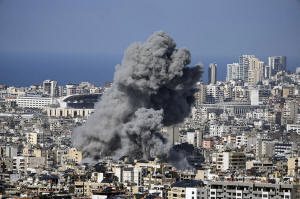Israeli strikes set off explosions in Beirut suburbs and kill 14
Palestinians in Gaza, medics say
 Send a link to a friend
Send a link to a friend
 [November 12, 2024]
By WAFAA SHURAFA [November 12, 2024]
By WAFAA SHURAFA
DEIR AL-BALAH, Gaza Strip (AP) — Israeli airstrikes hit a cafeteria and
a home in Gaza, killing at least 14 people, medical officials said. In
Lebanon, warplanes struck the capital Beirut’s southern suburbs on
Tuesday after the military ordered a number of houses there to evacuate.
The new bombardment on both fronts comes on the verge of a deadline set
by the United States for Israel to dramatically ramp up humanitarian aid
allowed in Gaza or risk possible restrictions on U.S. military funding.
A group of eight international aid agencies said in a report on Tuesday
that Israel has failed to meet the U.S. demands.
In Lebanon, large explosions shook Beirut’s southern suburbs — an area
known as Dahiyeh where Hezbollah has a significant presence — soon after
the Israeli military issued evacuation orders for 11 houses there.
There was no immediate word on casualties. The military said the houses
contained Hezbollah installations, but the claim could not be
independently confirmed.

Late Monday night, a strike hit the village of Ain Yaacoub in northern
Lebanon, killing at least 16 people, the Lebanese civil defense said.
Four of the killed were Syrian refugees, and there were another 10
people wounded. There was no immediate Israeli military comment on the
strike.
Israel has been carrying out intensified bombardment of Lebanon since
late September, vowing to cripple Hezbollah and put a stop to more than
year of cross-border fire by the Lebanese militant group onto northern
Israel.
At the same time, Israel has continued its campaign in Gaza, now more
than 13 months old, triggered by Hamas’ Oct. 7, 2023 attack on southern
Israel.
An Israeli strike late Monday hit a makeshift cafeteria used by
displaced people in Muwasi, the center of a “humanitarian zone” that
Israel’s military declared earlier in the war.
At least 11 people were killed, including two children, according to
officials at Nasser Hospital, where the casualties were taken. Video
from the scene showed men pulling bloodied wounded from among tables and
chairs set up in the sand in an enclosure made of corrugated metal
sheets.
Another strike early Tuesday hit a house in the urban Nuseirat refugee
camp in central Gaza, killing three people including a woman, according
to al-Awda Hospital, which received the casualties. The strike also
wounded 11 others, it said.
The Israeli military had no immediate comment on the strikes.
Hours earlier, the Israeli military announced a small expansion of the
humanitarian zone, where it has told Palestinians evacuating from other
parts of Gaza to take refuge. Hundreds of thousands of displaced
Palestinians are sheltering in sprawling tent camps in and around Muwasi,
a largely desolate area of dunes and agricultural fields with few
facilities or services along the Mediterranean coast of southern Gaza.
Israeli forces have also been besieging the northernmost part of Gaza
since the beginning of October, battling Hamas fighters it says
regrouped there.
With virtually no food or aid allowed in for more than a month, the
siege has raised fears of famine among the tens of thousands of
Palestinians believed still sheltering there.

[to top of second column]
|

Smoke rises after an Israeli airstrike on Dahiyeh, in the southern
suburb of Beirut, Lebanon, Tuesday, Nov. 12, 2024. (AP Photo/Bilal
Hussein)

An Oct. 13 letter signed by U.S. Secretary of State Antony Blinken
and Defense Secretary Lloyd Austin gave Israeli 30 days to, among
other things, allow a minimum of 350 truckloads of goods to enter
Gaza each day.
So far, Israel has fallen short. In October, 57 trucks a day entered
Gaza on average, and 70 a day in the 10 days of November, according
to Israeli figures. The U.N. puts the number lower, at 37 trucks
daily since the beginning of October.
Israel has announced a flurry of measures in recent days to increase
aid, including opening a new crossing into central Gaza. But so far
the impact is unclear.
The military said Tuesday it had allowed hundreds of packages of
food and water into Jabaliya and Beit Hanoun, two areas under siege
in the far north of Gaza. The Palestinian civil defense agency said
three trucks carrying flour, canned food and water reached Beit
Hanoun.
It was only the second delivery allowed into the area since the
beginning of October; a smaller cargo was let in last week, though
not all of it reached shelters in the north, according to the U.N.
The military announced Tuesday that four soldiers were killed in
Jabaliya, bringing to 24 the number of soldiers killed in the
assault there since it began. Palestinian health officials say
hundreds of Palestinians have been killed, though the true numbers
are unknown as rescue workers are unable to reach buildings
destroyed in strikes. Israel has ordered residents in the area to
evacuate. But the U.N. has estimated some 70,000 people remain.
Many Palestinians there fear Israel aims to permanently depopulate
the area to more easily keep control of it. On Tuesday, witnesses
told The Associated Press that Israeli troops had encircled at least
three schools in Beit Hanoun, forcing hundreds of displaced people
sheltering inside to leave.

Drones blared announcements demanding people move south to Gaza
City, said Mahmoud al-Kafarnah, speaking from one of the schools as
sounds of gunfire could be heard. “The tanks are outside,” he said.
“We don’t know where to go.”
Hashim Afanah, sheltering with at least 20 other people in his
family home, said the forces were evicting people from houses and
shelters.
Israel’s campaign in Gaza has killed more than 43,000 Palestinians,
according to local health authorities that do not distinguish
between civilians and militants in their count but say more than
half the dead are women and children. Israel says it targets Hamas
militants and blames the militant group for civilian deaths, saying
it operates in residential areas and infrastructure, and among
displaced people.
The war in Gaza began when Hamas-led militants stormed into southern
Israel on Oct. 7, 2023, killed around 1,200 people, mostly
civilians, and abducted about 250 as hostages. Around 100 hostages
are still inside Gaza, about a third of them believed to be dead.
___
Associated Press reporters Samy Magdy in Cairo and Melanie Lidman in
Jerusalem contributed to this report.
All contents © copyright 2024 Associated Press. All rights reserved |